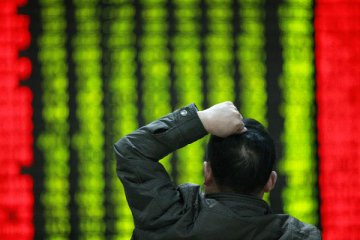
As one of the emergency policies to deal with dramatic fluctuation of the stock market in the middle of last year, the ban to forbid substantial shareholders of listed companies to decrease their shareholdings will expire on this Friday. There is a rumor in the market that non-tradable stocks valued 1 trillion yuan will be intensively sold, which makes both stock indexes and investors bear large pressure. China Securities Regulatory Commission (CSRC) indicated before the opening yesterday that it is studying and improving the regulations related to substantial shareholders’ decrease in shareholdings and will issue them recently. This move aims to facilitate the orderly quit of emergency measures and prevent the hit from shareholding-decrease on the market.
Lifting of ban on substantial shareholders seamlessly connects to new shareholding-decrease regulations
This Friday, the said ban implemented by the CSRC to deal with dramatic market fluctuation in 2015 will expire, and the said rumor also presses the A-share market. In the morning yesterday, CSRC spokesman Deng Ge responded in the public that CSRC is studying and improving the regulations related to substantial shareholders’ decrease in shareholdings and will issue them recently.
As one of the emergency policies to deal with dramatic fluctuation of the stock market in the middle of last year, No.18 Document [2015] (hereinafter referred as the “No.18 Document”) released by the CSRC on July 8, 2015 proposed that “controlling shareholders, shareholders, directors, supervisors and senior managers of listed companies who hold the shares of over 5 percent are banned from decreasing the shareholdings of corresponding listed companies through the secondary market”, and other relevant regulations will be issued after the said ban expires.
Actually, “other relevant regulations” have already been processed. Deng indicated in the interview yesterday that CSRC is researching, improving and standardizing regulations on shareholding-decrease of substantial shareholders, directors, supervisors and senior managers, building up shareholding-decrease pre-disclosure system for those who decrease the shareholdings through call auction, limiting shareholding-decrease proportion within a certain period, and guiding their decrease in shareholdings through block trade and transfer agreement.
SSN journalist learnt that the said regulations now have been submitted to a higher authority for approval, and will be released for implementation after necessary procedures are finished. It is worthy to notice that the ban is seamlessly connected to new shareholding-decrease regulations, no matter when to issue the new regulations. Therefore, it may be just a pessimistic imagination in the market that a large number of substantial shareholders dump the stocks after the ban expires.
Expiration of the said ban is just an issue that we can expect. Along with recovery and normalization of the stock market, emergency policies will exit and give way for optimized and improved regulations and systems to repair and build the market, which is natural.
Experts proposed that shareholders, no matter small or large, have the right to carry out transactions in the stock market, and substantial shareholders, directors, supervisors and senior managers of listed companies, who gain advantages in shareholding cost and information, should not be forbidden to decrease the shareholdings, but they can be guided or standardized to decrease their shareholdings. Industrial insiders expected that new shareholding-decrease regulations to be issued will not simply carry out one step to extend the ban, but to optimize and improve the measures based on existing laws and rules.
Pre-disclosure mechanism to improve for substantial shareholders’ shareholding-decrease to prevent someone taking advantage of loopholes
Currently, laws and regulations standardizing shareholding-decrease of substantial shareholders, directors, supervisors and senior managers in China’s capital market mainly include Securities Law, Acquisition Management Method on Listed Companies, Pre-disclosure Items for Shareholders of Listed Companies to Decrease the Shareholdings (exposure draft) of Shanghai Stock Exchange (hereinafter referred as the “Pre-disclosure Items”).
Partially, the Pre-disclosure Items issued in July 2014 clearly pointed out that controlling shareholders, actual controllers, person/party acting in concert or shareholders with over 5 percent equities of listed companies must pre-disclose their shareholding-decrease plan three trading days before the first shareholding-decrease action, if they will or expect to independently or jointly decrease the shareholdings of 5 percent or above in next six months through call auction or block trade; shareholdings decreased by related shareholders in any successive six-month must be less than 5 percent, if they do not disclose the plans.
Market participants have mainly proposed opinions for improvement on two aspects since implementation of Pre-disclosure Items. Firstly, regulations apply for a small scope, which should also cover directors, supervisors and senior managers of listed companies; secondly, substantial shareholders are easy to take advantage of 5 percent line set for pre-disclosure, and they may purposely decrease the shareholdings by 4.99 percent to escape from disclosure. Therefore, related standards and design should be improved to build up a diversified disclosure standard system, including proportion, market value and etc.
Industrial insiders expected that new regulations may be improved based on this after the said ban expires, and it is also possible to raise the hierarchy of related laws and regulations.
Sun Jianbo, chief strategy analyst of China Galaxy Securities, believed that shareholders are entitled to enjoy equal rights to conduct normal share trading, but behaviors of substantial shareholders and other major shareholders of listed companies might play an important role in enterprises operation. Establishing the pre-disclosure system on share sales by major shareholders of listed companies after the stock-selling ban expires can give investors stable expectation and ease the short-term impact caused by the exit of interim measures.
Dong Dengxin, a securities researcher at Wuhan University of Science and Technology, said that the new rules to better regulate share sales by major shareholders will depend on situations and criteria of the pre-disclosure system may be diversified.
Specifically, Dong put forward his understandings from the following three aspects. Firstly, there may be indicators of proportion and scale of shareholding decrease included in the new rules. Shareholders must disclose their stock-selling plan when meeting one of the two indicators. Secondly, the new rules will establish the pre-disclosure system on share sales by major shareholders of listed companies, which requires shareholders to disclose their plan 15-20 trading days in advance if they would like to reduce their shareholdings to a certain amount in a certain period. This will leave investors with enough time to make decisions. Thirdly, the new rules will impose stricter requirements on shareholders who sell their stock through call auction and encourage them to sell stocks through block trading and private negotiation.
In fact, whether shareholders can reduce shareholdings is one thing and whether they are willing to do this is another thing. In the opinion of most institutions, the real pressure brought by shareholding decrease mainly comes from the overvalued small-cap stocks and the stocks with poor performance, while selling stocks of other sectors especially the blue-chip stocks won’t bring greater pressure.
Deng Ge also stressed in his response yesterday that although the market value of tradable shares of substantial shareholders is quite large, not all of the substantial shareholders have demand for selling stocks. In terms of ways of decreasing shareholdings, the actual situation in recent years indicates that 60 percent of substantial shareholders decrease their shareholdings through block trading and negotiated transfer, while the value of capital involved in share sales by major shareholders through call auction only accounts for around 0.7 percent of the total market value of tradable shares.
(Translated by Jelly Yi & Vanessa Chen)





















Latest comments